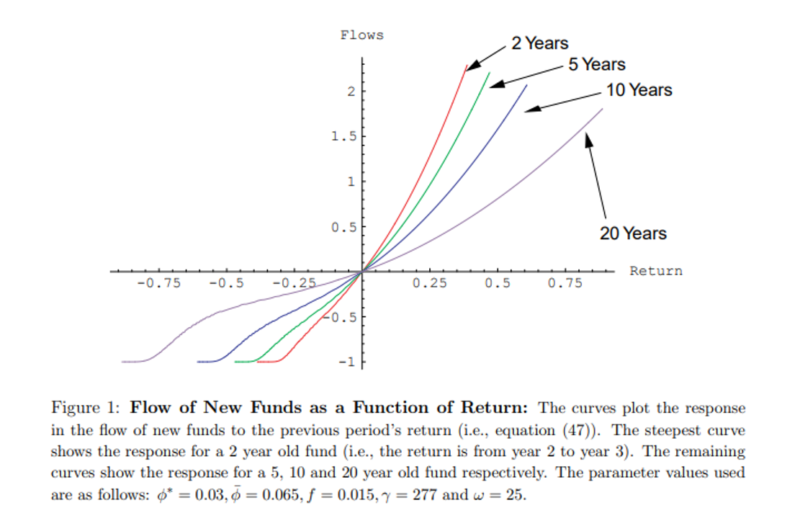Itzhak Ben-David, Jiacui Li, Andrea Rossi, and Yang Song contribute to the literature on the behavior of individual investors with their July 2021 study “What Do Mutual Fund Investors Really Care About?”, published in the July 2021 issue of The Review of Financial Studies. They began by noting that while researchers agree that fund flows are strongly correlated with past performance, there is little agreement as to how to interpret this empirical phenomenon—are individual investors just exhibiting a recency bias in chasing returns, or do fund flows reflect investors learning about fund manager’s skill, continually assessing them and reallocating capital accordingly as theorized by Jonathan Berk and Richard Green in their 2004 study “Mutual Fund Flows and Performance in Rational Markets”?
To determine if individuals are just naïve performance chasers, unaware of the financial literature, or whether they are sophisticated investors Ben-David, Li, Rossi, and Song examined mutual fund flows spanning the period 1991-2017. Returns were analyzed in both raw terms as well as compared to the CAPM, the Fama-French three-factor model (market beta, size, and value), and the Fama-French four-factor model (adding momentum).
Following is a summary of their findings:
- Individuals are simple decision makers who invest using easily obtainable information and do not adjust fund performance using asset pricing models.
- Simple performance-chasing behavior explained the major flow patterns observed in the mutual fund market.
- Individual investors do not engage in sophisticated learning about managers’ alpha-generating ability and do not distinguish between fund returns attributable to risk factor exposure versus alpha.
- Morningstar star ratings and past unadjusted returns best explained which funds attracted flows, with both ratings and unadjusted returns having strong independent effects on flows—fund rankings based on alphas from common asset pricing models do not help to predict flows better than unadjusted returns-based rankings. In some econometric specifications, funds with high alphas received significantly lower flows than funds with high unadjusted returns.
- Performance chasing occurs regardless of whether funds are actively managed or are passive index trackers.

Their findings led Ben-David, Li, Rossi, and Song to conclude:
“Our results are consistent with the view that, on average, households are homo sapiens with limited financial sophistication rather than hyperrational alpha-maximizing agents, as often assumed in the literature.”
They added:
“We find no evidence that investors treat alpha and beta returns differently.”
This adds more to our argument that Even God Would Get Fired as an Active Investor. They also observed that their findings are consistent with those of many other studies which have found that…
“households often engage in sub-optimal financial decision-making in a variety of domains (e.g., banking fees, credit cards, mortgages). This behavior has been attributed to several factors: poor financial literacy, extensive use of rules of thumb, and behavioral biases. Most households exhibit low levels of financial literacy, and many are not familiar with basic concepts of investing such as compounded interest, risk, diversification, and inflation. More broadly, households use a myriad of rules of thumbs to manage their financial affairs.”
They noted that the research has found that:
“even highly educated and intelligent individuals (with SAT scores above the 98th percentile) chase uninformative index fund returns.”
Since the recent performance of mutual funds is not a good predictor of future returns, chasing returns is not a good strategy. The bottom line is that investors would be better served if instead of acting as homo sapiens, they acted as economists theorize, as rational homo economicus. Which are you?
Important Disclosures
The information presented herein is for educational purposes only and should not be construed as specific investment, accounting, legal or tax advice. Certain information may be based on third-party data that may become outdated or otherwise superseded without notice. Third-party information is deemed to be reliable, but its accuracy and completeness cannot be guaranteed. By clicking on any of the links above, you acknowledge that they are solely for your convenience, and do not necessarily imply any affiliations, sponsorships, endorsements or representations whatsoever by us regarding third-party Web sites. We are not responsible for the content, availability or privacy policies of these sites, and shall not be responsible or liable for any information, opinions, advice, products or services available on or through them. The opinions expressed by featured authors are their own and may not accurately reflect those of the Buckingham Strategic Wealth® or Buckingham Strategic Partners® (collectively Buckingham Wealth Partners). LSR-21-135
About the Author: Larry Swedroe
—
Important Disclosures
For informational and educational purposes only and should not be construed as specific investment, accounting, legal, or tax advice. Certain information is deemed to be reliable, but its accuracy and completeness cannot be guaranteed. Third party information may become outdated or otherwise superseded without notice. Neither the Securities and Exchange Commission (SEC) nor any other federal or state agency has approved, determined the accuracy, or confirmed the adequacy of this article.
The views and opinions expressed herein are those of the author and do not necessarily reflect the views of Alpha Architect, its affiliates or its employees. Our full disclosures are available here. Definitions of common statistics used in our analysis are available here (towards the bottom).
Join thousands of other readers and subscribe to our blog.

